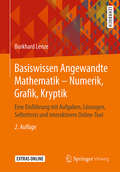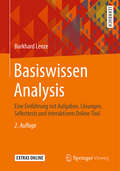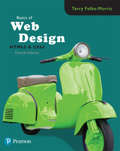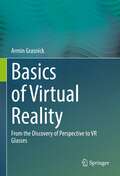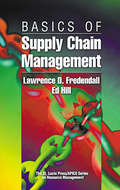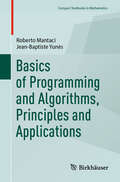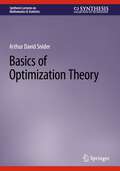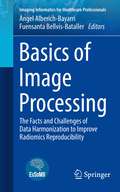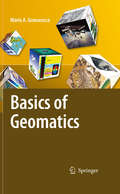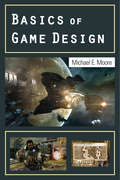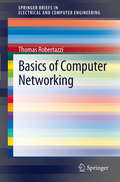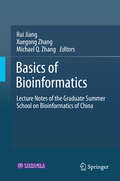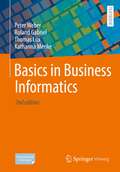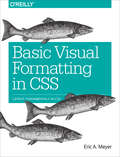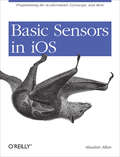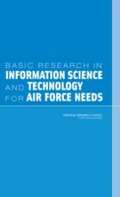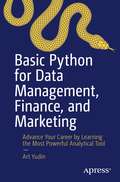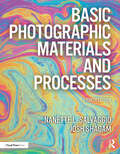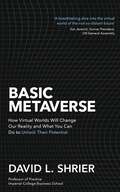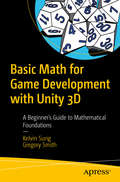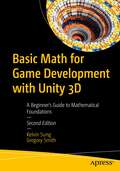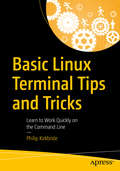- Table View
- List View
Basiswissen Angewandte Mathematik – Numerik, Grafik, Kryptik: Eine Einführung mit Aufgaben, Lösungen, Selbsttests und interaktivem Online-Tool
by Burkhard LenzeDieses Buch bietet eine schlanke und gut zugängliche Hinführung zur Angewandten Mathematik, speziell zur Numerischen Mathematik, Aspekten der Computer-Grafik sowie der Verschlüsselungstechnik. Rund 140 komplett durchgerechnete Beispiele, gut 100 Aufgaben mit Lösungen sowie etwa 50 Selbsttests mit Lösungen erleichtern den Zugang zum Thema. Abgerundet wird das Ganze durch etwa 80 Skizzen im Text sowie ein online verfügbares interaktives pdf-Tool zum Generieren von Zufallsaufgaben inklusive Lösungen. Das Buch richtet sich an Studierende in Studiengängen mit mathematischen Pflichtveranstaltungen im Grundstudium an Universitäten und Fachhochschulen. Es ist sowohl als Begleitlektüre für entsprechende Vorlesungen als auch zum Selbststudium optimal geeignet.
Basiswissen Analysis: Eine Einführung mit Aufgaben, Lösungen, Selbsttests und interaktivem Online-Tool
by Burkhard LenzeDieses Buch bietet eine schlanke und gut zugängliche Hinführung zur Analysis. Gut 100 komplett durchgerechnete Beispiele, etwa 50 Aufgaben mit Lösungen sowie rund 40 kleine Selbsttests mit Antworten erleichtern den Zugang zum Thema. Abgerundet wird das Ganze durch etwa 80 Skizzen im Text sowie ein online verfügbares interaktives pdf-Tool zum Generieren von Zufallsaufgaben inklusive Lösungen. Das Buch richtet sich an Studierende in Studiengängen mit mathematischen Pflichtveranstaltungen im Grundstudium an Universitäten und Fachhochschulen. Es ist sowohl als Begleitlektüre für entsprechende Vorlesungen als auch zum Selbststudium optimal geeignet.
Basics of Web Design: HTML5 and CSS3 Second Edition
by Terry Felke-MorrisBasics of Web Design: HTML5 and CSS3, 2e covers the basic concepts that web designers need to develop their skills: Introductory Internet and Web concepts Creating web pages with HTML5 Configuring text, color, and page layout with Cascading Style Sheets Configuring images and multimedia on web pages Web design best practices Accessibility, usability, and search engine optimization considerations Obtaining a domain name and web host Publishing to the Web
Basics of Web Design: HTML5 & CSS3
by Terry Felke-MorrisFor introductory courses in Web Design. The Fundamentals of Web Development for the New Designer Basics of Web Design: HTML5 & CSS3 is the comprehensive source material for beginners in web design and development. The hands-on text introduces major topics in two-page sections, focusing on key concepts and providing interactive exercises. All the basics of web designs, from creating web pages to publishing them online, are explored in-depth by each chapter of this book. With a focus on HTML5 and CSS3 coding techniques, the Third Edition prepares readers to take advantage of the most modern and popular platforms for web development. Exploring both "hard skills," such as HTML5 and Cascading Style Sheets, as well as 'soft skills' like web design and publishing to the web, the text teaches coders all the fundamental information they need to design successful websites.
Basics of Virtual Reality: From the Discovery of Perspective to VR Glasses
by Armin GrasnickToday, the reality we know can be recorded and reproduced true to reality using technical processes. Space and time are recreated virtually as a copy in artificial reality. However, the reproduction of virtual reality is not limited to a mere copy of what exists. A visitor to the virtual space does not have to be content with the pixelated image of the old familiar, but can encounter unreal phenomena in the illusory world that never existed in real life or are even physically impossible. This enables an expansion of the recorded reality and allows the perception of surprisingly new perspectives.A perspective denotes the perception of a fact from a certain point of view and corresponds to the way of looking at things. But a perspective is also the observation of a scene from a viewing position. From different perspectives the illusion of reality arises during the reproduction by observation. This vision is not based on imagination or hallucination, but is the basic function of virtual reality. This book describes the concepts, systems, and technologies used to create virtual reality from its ancient beginnings to the present, and provides a glimpse into a possible future.This book is a translation of the original German 1st edition Grundlagen der virtuellen Realität by Armin Grasnick, published by Springer-Verlag GmbH Germany, part of Springer Nature in 2020. The translation was done with the help of artificial intelligence (machine translation by the service DeepL.com). A subsequent human revision was done primarily in terms of content, so that the book will read stylistically differently from a conventional translation. Springer Nature works continuously to further the development of tools for the production of books and on the related technologies to support the authors.
Basics of Supply Chain Management (Resource Management)
by Lawrence D. Fredendall Ed HillSupply Chain Management (SCM) was once a "pie in the sky" concept that could not be fully achieved. A key barrier was the cost of communicating with and coordinating among the many independent suppliers in each supply chain. SCM is possible because of three changes: technology has developed that simplifies communication, new management paradigms ha
Basics of Programming and Algorithms, Principles and Applications (Compact Textbooks in Mathematics)
by Roberto Mantaci Jean-Baptiste YunèsThis textbook offers an introduction to topics in algorithms and programming with python. It is originally intended for mathematical students not sufficiently aware about these computer science fields seeking a deeper understanding. It addresses fundamental questions on how to analyze the performance of an algorithm and equips readers with the skills to implement them using python. The textbook is organized in two parts. Part I introduces Python Programming offering a solid foundation to python essentials. Topics covered include first steps in python programming, programs, functions and recursion, data structures. Part II shifts focus to Algorithms and covers topics such as algorithm performance, recursion, the sorting problem, trees as data structures, etc. This book has its origins from several different courses given in the context of thematic schools to diverse audiences in different countries over the years. These countries include Cambodia, Kenya, and Madagascar.
Basics of Optimization Theory (Synthesis Lectures on Mathematics & Statistics)
by Arthur David SniderThis book presents a short introduction to the main tools of optimization methodology including linear programming, steepest descent, conjugate gradients, and the Karush-Kuhn-Tucker-John conditions. Each topic is developed in terms of a specific physical model, so that the strategy behind every step is motivated by a logical, concrete, easily visualized objective. A quick perusal of the Fibonacci search algorithm provides a simple and tantalizing first encounter with optimization theory, and a review of the max-min exposition of one-dimensional calculus prepares readers for the more sophisticated topics found later in the book. Notable features are the innovative perspectives on the simplex algorithm and Karush-Kuhn-Tucker-John conditions as well as a wealth of helpful diagrams. The author provides pointers to references for readers who would like to learn more about rigorous definitions, proofs, elegant reformulations and extensions, and case studies. However, the book is sufficiently self-contained to serve as a reliable resource for readers who wish to exploit commercially available optimization software without investing the time to develop expertise in its aspects.This book also:Features innovative perspectives on the simplex algorithm and Krushal-Kuhn-Tucker-John conditionsServes as a resource for readers to use the tools of optimization without needing to acquire expertise in the theoryFeatures plentiful resources that focus on rigorous definitions, proofs, and case studies
Basics of Image Processing: The Facts and Challenges of Data Harmonization to Improve Radiomics Reproducibility (Imaging Informatics for Healthcare Professionals)
by Ángel Alberich-Bayarri Fuensanta Bellvís-BatallerThis book, endorsed by EuSoMII, provides clinicians, researchers and scientists a useful handbook to navigate the intricate landscape of data harmonization, as we embark on a journey to improve the reproducibility, robustness and generalizability of multi-centric real-world data radiomic studies. In these pages, the authors delve into the foundational principles of radiomics and its far-reaching implications for precision medicine. They describe the different methodologies used in extracting quantitative features from medical images, the building blocks that enable the transformation of images into actionable predictions. This book sweeps from understanding the basis of harmonization to the implementation of all the knowledge acquired to date, with the aim of conveying the importance of harmonizing medical data and providing a useful guidance to enable its applicability and the future use of advanced radiomics-based models in routine clinical practice. As authors embark on this exploration of data harmonization in radiomics, they hope to ignite discussions, foster new ideas, and inspire researchers, clinicians, and scientists alike to embrace the challenges and opportunities that lie ahead. Together, they elevate radiomics as a reproducible technology and establish it as an indispensable and actionable tool in the quest for improved cancer diagnosis and treatment.
Basics of Geomatics
by Mario A. GomarascaThis volume presents a comprehensive and complete treatment. In a systematic way the complex topics and techniques are covered that can be assembled under Geospatial Information namely, Geodesy, Cartography, Photogrammetry, Remote Sensing, Informatics, Acquisition Systems, Global Positioning Systems, Digital Image Processing, Geographic Information Systems, Decision Support Systems, and WebGIS. It describes in detail and at an accessible level - too much math has been avoided - the state of current knowledge. Per chapter a detailed bibliography has been included. As such, it will serve as a working tool not only to geoscientists and geographers but also to engineers, architects, computer scientists, urban planners, specialists in GIS, remote sensing, forestry, agricultural science, soil science geometry, environmental scientists and managers. Applications can be found in security, risk management, monitoring, info-mobility, geo-positioning, food traceability, etc. From the reviews: "The book is rigorous and synthetic, describing with precision the main instruments and methods connected to the multiple techniques today available. The objective pursued is to publish an integrated text, containing simple and comprehensible concepts relevant to experts in Geo-spatial Information." S. Dequal, Professor of Topography and Photogrammetry, DITAG, Polytechnic of Turin, Italy "This book fills a void of telling and showing the reader how remote sensing as a part of geomatics really works. With a clearly presented historical review up to the present time, the author illustrates the basic theories and use of the different remote sensing sensors and how to analyze the data from them for their application. This book would be a complement to the standard remote sensing books and I would highly recommend it for all land oriented professionals and especially graduate students who need a clear explanation of how remote sensing works". Chris J. Johannsen, Professor Emeritus of Agronomy, Department of Agronomy, Purdue University, West Lafayette, Indiana, USA "Basics of Geomatics" is structured in a clear and effective way into thematic chapters that provide a fundamental, yet comprehensive coverage of each of the major disciplines making up the field of Geomatics. Thanks to its clarity and completeness, the text, supplemented by many useful tables and illustrations will serve as a basic reference work for both beginners and experienced readers". John L. van Genderen, Professor, International Institute for Geoinformation Science and Earth Observation (ITC), Department of Earth Observation Science, Enschede, The Netherlands.
Basics of Game Design
by Michael MooreBasics of Game Design is for anyone wanting to become a professional game designer. Focusing on creating the game mechanics for data-driven games, it covers role-playing, real-time strategy, first-person shooter, simulation, and other games. Written by a 25-year veteran of the game industry, the guide offers detailed explanations of how to design t
Basics of Computer Networking (SpringerBriefs in Electrical and Computer Engineering)
by Thomas RobertazziSpringer Brief Basics of Computer Networking provides a non-mathematical introduction to the world of networks. This book covers both technology for wired and wireless networks. Coverage includes transmission media, local area networks, wide area networks, and network security. Written in a very accessible style for the interested layman by the author of a widely used textbook with many years of experience explaining concepts to the beginner.
Basics of Computer Hardware (OE-101-ELS) First Semester FYBA, B.COM New NEP Syllabus - SPPU
by Prof. Dr. P. B. Buchade Prof. Dr. M. L. Dongare S. R. Chaudhari Ms Shital KanasakarA textbook on Basics of Computer Hardware designed for undergraduate students as per the National Education Policy (NEP) syllabus. It offers an introduction to computer fundamentals, including computer components, microprocessors, memory, and peripherals. Topics range from defining and classifying computers to explaining microprocessors' working, motherboard architecture, and input/output devices. With diagrams, examples, and exercises, the book simplifies complex concepts for beginners, preparing them for careers in electronics and related fields.
Basics of Bioinformatics: Lecture Notes of the Graduate Summer School on Bioinformatics of China
by Rui Jiang Xuegong Zhang Michael Q. ZhangThis book outlines 11 courses and 15 research topics in bioinformatics, based on curriculums and talks in a graduate summer school on bioinformatics that was held in Tsinghua University. The courses include: Basics for Bioinformatics, Basic Statistics for Bioinformatics, Topics in Computational Genomics, Statistical Methods in Bioinformatics, Algorithms in Computational Biology, Multivariate Statistical Methods in Bioinformatics Research, Association Analysis for Human Diseases: Methods and Examples, Data Mining and Knowledge Discovery Methods with Case Examples, Applied Bioinformatics Tools, Foundations for the Study of Structure and Function of Proteins, Computational Systems Biology Approaches for Deciphering Traditional Chinese Medicine, and Advanced Topics in Bioinformatics and Computational Biology. This book can serve as not only a primer for beginners in bioinformatics, but also a highly summarized yet systematic reference book for researchers in this field. Rui Jiang and Xuegong Zhang are both professors at the Department of Automation, Tsinghua University, China. Professor Michael Q. Zhang works at the Cold Spring Harbor Laboratory, Cold Spring Harbor, NY, USA.
Basics in Business Informatics
by Thomas Lux Roland Gabriel Peter Weber Katharina MenkeThis book takes you on a journey into the world of business informatics. It has a modular structure and covers the key aspects of business informatics. Besides the thematic introductions, each chapter includes excursuses, review questions, and practical exercises, for which solutions are provided in a separate chapter. The book concludes with two teaching cases on digital transformation. It is designed for students and lecturers at universities and technical colleges, but also as a resource for IT trainings.
Basics Of Web Design: HTML5 And CSS
by Terry Felke-MorrisBasics of Web Design: HTML5, is a foundational introduction to beginning web design and web development. The text provides a balance of "hard" skills such as HTML 5, CSS, and "soft" skills such as web design and publishing to the Web, giving students a well-rounded foundation as they pursue careers as web professionals. Students will leave an introductory design course with the tools they need to build their skills in the fields of web design, web graphics, and web development. <P><P> The 5th Edition features a major change from previous edition. Although classic page layout methods using CSS float are still introduced, there is a new emphasis on Responsive Page Layout utilizing the new CSS Flexible Box Layout (Flexbox) and CSS Grid Layout techniques. Therefore, the new 5th Edition features new content, updated topics, hands-on practice exercises, and case studies.
Basic Visual Formatting in CSS: Layout Fundamentals in CSS
by Eric A. MeyerSome aspects of the CSS formatting model may seem counterintuitive at first, but as you’ll learn in this practical guide, the more you work with these features, the more they make sense. Author Eric Meyer gives you a good grounding in CSS visual rendering, from element box rules and concepts to the specifics of managing tricky layouts for block-level and inline elements.Short and sweet, this book is an excerpt from the upcoming fourth edition of CSS: The Definitive Guide. When you purchase either the print or the ebook edition of Basic Visual Formatting in CSS, you’ll receive a discount on the entire Definitive Guide once it’s released. Why wait? Learn how to bring life to your web pages now.Learn the details of element box types, including block, inline, inline-block, list-item, and run-in boxesChange the type of box an element generates, from inline to block, or list-item to inlineDive into the complexities of horizontal and vertical block-box formattingExplore key concepts of inline layout: anonymous text, em box, content area, leading, inline box, and line boxUnderstand formatting differences between nonreplaced and replaced inline elements
Basic Sensors in iOS: Programming the Accelerometer, Gyroscope, and More
by Alasdair AllanWhat really sets the iPhone apart from laptops and PCs is its use of onboard sensors, including those that are location-enabled. This concise book takes experienced iPhone and Mac developers on a detailed tour of iPhone and iPad hardware by explaining how these sensors work, and what they're capable of doing.With this book, you'll build sample applications for each sensor, and learn hands-on how to take advantage of the data each sensor produces. You'll gain valuable experience that you can immediately put to work inside your own iOS applications for the iPhone, iPod touch, and iPad. This book helps you focus on:Camera: learn how to take pictures and video, create video thumbnails, customize video, and save media to the photo albumAudio: use the media picker controller and access the iPod music library in your own application, and enable your app to record and play sampled audioAccelerometer: write an application that uses this sensor to determine device orientationMagnetometer: learn how this sensor verifies compass headingsCore Motion: use this framework to receive motion data from both the accelerometer and the vibrational gyroscopeThis short book is part of a collection that will, along with new material, be compiled into a larger book, iOS Sensor Programming. The other books in this collection are Augmented Reality in iOS, Geolocation in iOS, and iOS Sensor Apps with Arduino.
Basic Research In Information Science And Technology For Air Force Needs
by National Research Council of the National AcademiesThe U.S. Air Force is developing new force capabilities appropriate to an emerging array of threats. It is clear that advances in information science and technology (IS&T) are essential for most of these new capabilities. As a consequence, the Air Force is finding it necessary to refocus its IS&T basic research program to provide stronger support for reaching these goals. To assist this effort, the AFOSR asked the NRC for a study to create a vision and plan for the IS&T-related programs within the Office’s Mathematics and Space Science Directorate. This report provides an assessment of basic research needs for Air Force systems and communications, software, information management and integration, and human interactions with IS&T systems. The report also offers a set of priorities for basic IS&T research, and an analysis of funding mechanisms its support.
Basic Python for Data Management, Finance, and Marketing: Advance Your Career by Learning the Most Powerful Analytical Tool
by Art YudinLearn how to gather, manipulate, and analyze data with Python. This book is a practical guide to help you get started with Python from ground zero and to the point where you can use coding for everyday tasks. Python, the most in-demand skill by employers, can be learned in a matter of months and a working knowledge will help you to advance your career. This book will teach you to crunch numbers, analyze big-data, and switch from spreadsheets to a faster and more efficient programming language. You'll benefit from the numerous real-life examples designed to meet current world challenges and from step-by-step guidance to become a confident Python user. Python is used in all aspects of financial industry, from algo trading, reporting and risk management to building valuations models and predictive machine learning programs. Basic Python for Data Management, Finance, and Marketing highlights how this language has become a useful skill with digital marketers, allowing them to analyze data more precisely and run more successful campaigns.What You'll LearnGet started with Python from square oneExtend what's possible on excel with PythonAutomate tasks with PythonAnalyze data more preciselyWho This Book Is ForProfessionals who want to find a job in the modern world or advance their careers within field of Python programming language.
Basic Photographic Materials and Processes
by Nanette L. Salvaggio Josh ShagamBasic Photographic Materials and Processes describes the three crucial stages of creating the perfect photograph—capture, processing and output—by providing a thorough technical investigation of modern, applied photographic technologies. This new edition has been fully revised and updated to explore digital image capture, processing and output. It covers a wide range of topics including: the scientific principles of measuring and recording light, the inner workings of digital cameras, image processing concepts, color management and photographic output to screen and print media. With these topics come in-depth discussions of extending dynamic range, image histograms, camera characterization, display capabilities, printer and paper technologies. It also includes applied exercises that provide the reader with a deeper understanding of the material through hands-on experiments and demonstrations, connecting theoretical concepts to real-world use. This comprehensive text provides photography students, educators and working professionals with the technical knowledge required to successfully create images and manage digital photographic assets. It is an essential resource for mastering the technical craft of photography.
Basic Metaverse: How Virtual Worlds Will Change Our Reality and What You Can Do to Unlock Their Potential
by David ShrierWhat is the metaverse? Quite simply, it's a digital platform to help people collaborate, work and play in new ways, in an immersive 3D environment. In Basic Metaverse, leading futurist David L. Shrier explains how the technology works, unpacks its potential uses - including its relationship to the development of Web3 - and its impact on everyday life and work. He explores some of the legal and moral quandaries that could accompany widespread adoption of this transformational technology, from issues of wealth disparity and access to what happens if your virtual avatar commits a crime in the metaverse.The metaverse future is full of possibility. One thing we can be certain of is that it will be stranger than we can imagine. Join Shrier as he journeys across virtual worlds in search of understanding.
Basic Math for Game Development with Unity 3D: A Beginner's Guide to Mathematical Foundations
by Gregory Smith Kelvin SungUse Unity-based examples to understand fundamental mathematical concepts and see how they are applied when building modern video game functionality. You will gain the theoretical foundation you need, and you will know how to examine and modify an implementation. This book covers points in a 3D Cartesian coordinate system, and then discusses vectors and the details of dot and cross products. Basic mathematical foundations are illustrated through Unity-based example implementations. Also provided are examples showing how the concepts are applied when implementing video game functionality, such as collision support, motion simulations, autonomous behaviors, shadow approximations, and reflection off arbitrary walls. Throughout this book, you learn and examine the concepts and their applications in a game engine. What You Will Learn Understand the basic concepts of points and vectors and their applications in game developmentApply mathematical concepts to modern video game functionality, such as spherical and box collidersImplement autonomous behaviors, including following way points, facing a target, chasing an object, etc. Who This Book is For Beginners, and those interested in the implementation of interactive games, who need a basic mathematical background or a refresher with modern examples
Basic Math for Game Development with Unity 3D: A Beginner's Guide to Mathematical Foundations
by Gregory Smith Kelvin SungThis book will teach you fundamental mathematical concepts using Unity-based custom examples, explaining the implementations and demonstrating how these concepts are applied in building modern video game functionality. You will learn the theoretical foundation of each concept, and then interact, examine, and modify the implementation to inspect the effects. Basic Math for Game Development with Unity 3D begins by explaining points in the 3D Cartesian Coordinate system. From there, you’ll gain insight into vectors and details of dot and cross products, quaternions, rotation and decomposition of vectors. These basic mathematical foundations are illustrated through Unity-based example implementations. Associated with these concept presentations are separate examples of how the concepts are applied in creating typical video game functionality, such as collision support, motion simulations, autonomous behaviors, shadow approximations, and reflections off surfaces with arbitrary orientations. After completing this book, you will have a thorough understanding of core mathematical concepts and how they are used to create compelling gameplay. What You Will Learn Understand the basic concepts of points and vectors, and their applications in game developmentGrasp the details of autonomous behaviors such as facing a target, following and chasing an object, and moreApply mathematical concepts in implementing modern video game functionality such as ray casting, collision, and motion control Who Is This Book For Game enthusiasts, hobbyists, and anyone else who is interested in the implementation of interactive games but needs basic mathematical background or could just use a refresher with modern examples.
Basic Linux Terminal Tips and Tricks: Learn to Work Quickly on the Command Line
by Philip KirkbrideLearn command line tricks, programs, and hacks you can use day to day as a Linux user, programmer, and system administrator. When you interact with the digital world, you can’t go far without interacting with Linux systems. This book shows you how to leverage its power to serve your needs. Many users know "top" is installed on almost all Linux machines, but did you know with a few keystrokes you can customize it specifically for your needs? Stuck using `cd` and `ls` commands for navigating file systems? This book looks at how you can use Ranger to quickly navigate through multiple levels of folders, and quickly run bash commands without ever leaving the terminal. We also suggest programs that can be used for common tasks such as finding which programs are using the most processing, data download/upload, and file space.You’ll know how to quickly connect to remote machines and run your commonly needed jobs in a keystroke or even on auto-pilot. With Basic Linux Terminal Tips and Tricks you'll be equipped with a wide range of tools that can be used for daily work and maintenance on all sorts of Linux systems including servers, desktops, and even embedded devices. What You Will LearnWork with common tools on your local network.Techniques for efficient use of command line.Easily manipulate text files for processing.Monitor the state of a system with a handful of popular programs.Combine programs to create useful processes.Who This Book Is For Anyone who is interested in Linux and Unix based operating systems as a hobby or for work.
